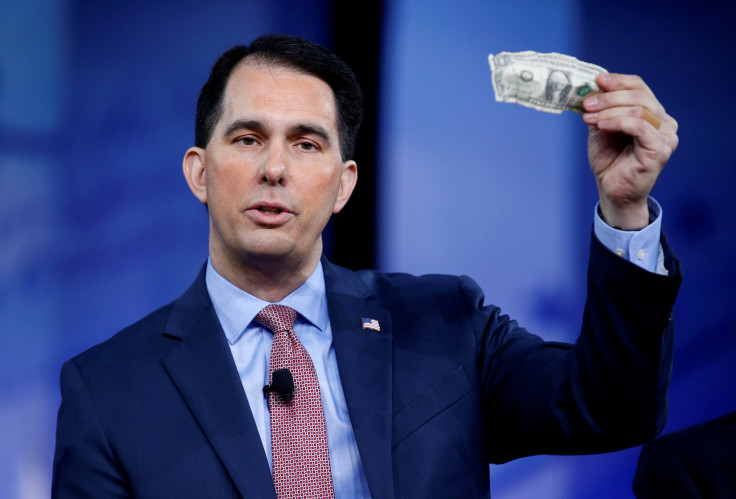What’s Not To Like About The Foxconn Deal? Criticism From Both Sides

Wisconsin voters can express their views of the state’s new deal to bring in technology manufacturer Foxconn at a public hearing Thursday, but critics of the deal have already weighed in — with objections raised by analysts on both sides of the political spectrum.
The Foxconn deal exempts the company from environmental protections and gives it $3 billion in tax breaks. Liberals have spoken out against what they see as corporate handouts, while conservatives objected to the government interfering in the market. And observers on both sides drew attention to the apparent hypocrisy of self-professed free-market ideologues such as Speaker of the House Paul Ryan and Gov. Scott Walker.
Read: Foxconn Deal Lets Company Ignore Wisconsin Environmental Protection Laws
“We can identify numerous Republicans, including those who were running for the presidency, as making heavy use of government subsidies to try to attract companies,” Nathan Jensen, a professor of government at the University of Texas, told International Business Times.
“Chris Christie in New Jersey offered some of the biggest incentive offers to companies. Jeb Bush in Florida, Rick Perry in Texas, and Scott Walker in Wisconsin have done the same. Walker has also had numerous scandals in the handling of economic development incentives. So the free-market rhetoric of these politicians definitely contrasts with their selective use of incentives,” Jensen said.
Gov. Walker in particular has been known for his strong free-market stances, having run his 2015 presidential campaign on a platform of smaller government and fewer regulations. In 2011, he signed an executive order creating an “Office of Free Market Healthcare” in Wisconsin.
“Economic development incentives are often cast as corporate welfare — a criticism from the left — and government picking winners and losers — a criticism from the right,” said Jensen. “Practically, economic development incentives are targeting scarce government resources to a very small number of firms. This means a company like Foxconn receives a sweetheart deal but this leaves Wisconsin taxpayers — individuals and companies — footing the tab.”
The $3 billion Foxconn deal includes a $1.5 billion tax credit for Foxconn’s planned $10 billion investment in Wisconsin. Another $1.35 billion in tax credits will be delivered in exchange for Foxconn’s planned 13,000 jobs. The package also includes a $150 million sales tax break for purchasing supplies and materials related Foxconn’s constructing facilities in the state.
“This is an attempt to let at least one sector of the economy escape from the full burden of sales taxes and some environmental regulations,” Thomas Bell, a law professor at Chapman University who works on high-tech regulatory and economic issues, told IBT. “There is a growing trend of governments creating special jurisdictions. But the more up-to-date approach is to let markets decide.”
Bell is an affiliate of the conservative Foundation for Economic Freedom, which is a member of the Koch brothers-funded State Policy Network. He previously worked at the libertarian, free-market Cato Institute. Bell took exception to the fact that the “Electronics and Information Technology Manufacturing Zone” created by Governor Walker’s bill is limited to a specific industry.
“The future of special jurisdictions is zones that let markets decide where to develop, what to put in them, and are allowed to regulate themselves — subject to oversight from government officials,” said Bell.
On the left, critics say the Foxconn deal is unnecessary corporate welfare. Kenneth Thomas, a professor of political science at the University of Missouri, argues that Foxconn wanted to come to the U.S. anyway, thanks to fears of protectionist policies from the new administration. Given that President Donald Trump has pulled out of the Trans-Pacific Partnership negotiations and is seeking to renegotiate NAFTA, it makes sense that Foxconn would want a domestic operation within one of its most lucrative consumer markets.
(And in fact, protectionism has already come to Wisconsin in one specific form, as Trump instituted a 20 percent tariff on Canadian lumber in April.)
“It looks like Foxconn knew where they wanted to go from the get-go. So this deal is a windfall for them,” said Thomas, whose book “Investment Incentives and the Global Competition for Capital” focuses on these tax incentive deals. “Wisconsin already had reasonably good bargaining power because of Foxconn’s desire to be in the U.S. and in Paul Ryan’s district.”
In Thomas’ view, Foxconn wanted to be in the country, but states were left to compete over the precise location. That meant that Foxconn could play states against one another in order to receive the best deal. Thomas would rather see more regulation on these deals — not less, as advocated by Bell and the right. By having caps set on state subsidies at the federal level, states would not have to bid blind against each other without limits. The European Union has managed to put together such regulations across independent nations, so Thomas believes that similar rules should be possible in the U.S.
“Under EU regulations, every region has a specific maximum amount of subsidy they can give,” said Thomas. “$3 billion would be an impossible subsidy in the EU by a long shot. Their regulations put substantial limits on what even the poorest areas can offer — the largest subsidy possible would be approximately $1 billion.”
In the past, Walker has used economic development to benefit his political donors and circumvent environmental regulations. In 2012, the mining company Gogebic Taconite donated $700,000 to a pro-Walker anonymous-donor group. Walker then advanced legislation to loosen environmental regulations related specifically to iron mining — Gogebic Taconite’s industry.
The jobs promised by the Wisconsin Economic Development Corporation, which was created by Walker, have not always materialized. In 2012, retailer Kohl’s was awarded $62.5 million in state tax subsidies for 3,000 jobs, yet only 473 jobs appeared. And some of the jobs were not full-time jobs paying $30,000 a year, so they did not qualify as jobs created under the terms of tax credits.
© Copyright IBTimes 2024. All rights reserved.





















